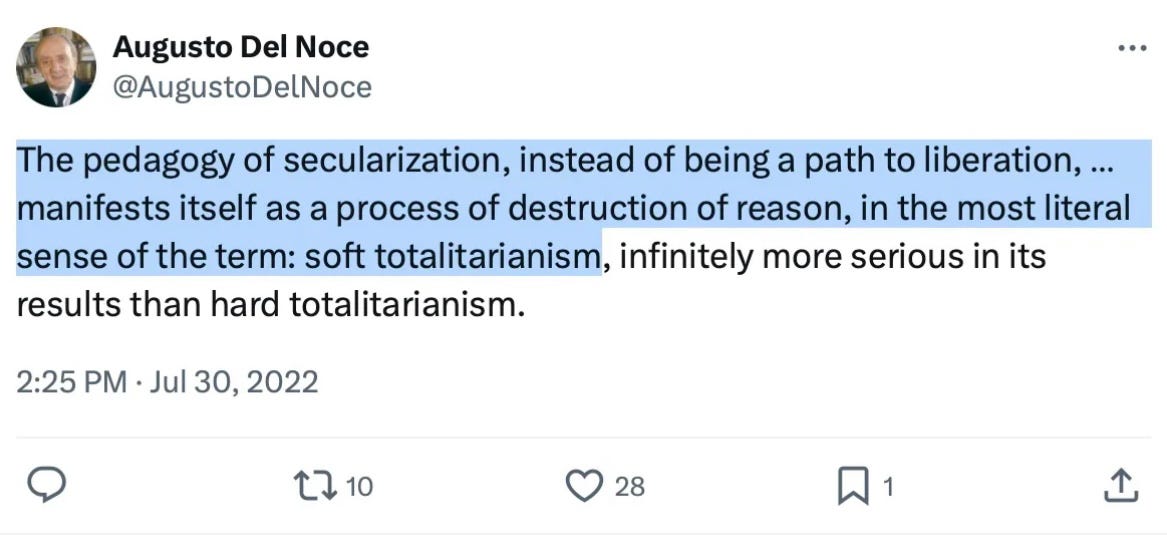Photo by Jarno Colijn on Unsplash
“modern cultureis emphaticallyrationalistic, believing in thepower of reason; surelyif such a culture loses its faith in reason’s ability to validate its highest aims, it is in a crisis”…
— Leo Strauss, Three Waves of Modernity
[LINK]
“The theory ofliberal democracy,as well as ofcommunism,originated in the first and second waves of modernity; the political implication of thethird wave proved to be fascism.
Yet thisundeniable factdoes not permit us to return to the earlier forms of modern thought:the critique of modern rationalism or of the modern belief in reason by Nietzsche cannot be dismissed or forgotten.This is the deepest reason for the crisis of liberal democracy.
The theoretical crisis does not necessarily lead to a practical crisis, for the superiority of liberal democracy to communism. Stalinist or post-Stalinist, is obvious enough.
And above all,liberal democracy, in contradistinction to communism and fascism,derives powerful support from a way of thinking which cannot be called modern at all: the premodern thought of our western tradition”…
— Leo Strauss, Three Waves of Modernity
[LINK]
“Todaymodern thoughtfaces itsgreatest crisis”…
— Augusto del Noce
The Illusion of Liberation - Modern Man’s Attempted Revolt Against God, Nature, and Himself [LINK] highlighted how the emergence of Modernist Philosophy (e.g. Cartesianism, Idealism, Nominalism, Modern Gnosticism, Nietzschean Perspectivism) was attempting to re-orientate the nature of Reality towards the Primacy of Human Consciousness and Primacy of Man (e.g. Theology of Marxism and Historical Materialism).
[LINK]
It represents a fundamental shift (i.e. a radical departure from Thomist Philosophy [LINK]) in how we understand the nature of Reality, and it inverts Epistemology (e.g. Scientific Gnosticism [LINK] - Scientific Socialism [LINK]) — an anti-human [LINK] simulacra of Being [LINK] where the map increasingly becomes the territory [LINK].
An endemic embracement of a Theology of Marxism [LINK] where an infinite [LINK] progressive process (Labour of the Negative [LINK]) of social and political transformation & change occurs via a Philosophy of Mechanical Action [LINK] - dialectical materialism that combined idealism, materialism, reflexivity and praxis [LINK] that results in a Historical Materialism [LINK] catalysed via a ‘spirit of negation’ [LINK].
[LINK]
However, the irony & paradox of Man’s attempts to unshackle & liberate himself from God, the natural world and himself [LINK] was that Reality had to now be imposed through force [LINK] via a process of mechanical action [LINK] and control [LINK].
[LINK]
In doing so, the pre-Modern Christian Theological & Ancient Greek Philosophical foundations of Reason are removed as the Logos is deconstructed [LINK] and a New Totalitarian regime is constructed [LINK] in its place.
[LINK]
One that ultimately leads to a Post-Truth Education [LINK], Post-Truth Society [LINK], a Theatre of the Absurd [LINK] [LINK] [LINK], a Nietzschean Will to Power [LINK] and a Modern Sophism [LINK] as Human ideas & beliefs mediated via Semiotic Signs [LINK] increasingly decouple from an independent objective Reality [LINK] grounded in Human Being in the World [LINK].
[LINK]
A failure to recognise Humanities’ participation in Reality [LINK], where our ideas have real-world consequences [LINK] [LINK].
[LINK]
Leo Strauss Critique: The Three Waves of Modernity
Leo Strauss’ 1960s essay - The Three Waves of Modernism [LINK] - presents a similar critique of the inevitable trajectory of the overlapping & emergent ideas of Modernism.
It begins with Man’s initial confidence in applying the scientific method (Sir Francis Bacon - a combination of empiricism & rationalism [LINK] - axioms of reductionism, determinism & causality [LINK] ) to controlling, manipulating and overcoming nature [LINK] (and ultimately extending this scientific & technocratic method to the individual who is part of nature [LINK] - Humans as Bestand - Standing Reserve (Heidegger) [LINK]).
[LINK]
It results in the emergence of the Scientific & Industrial Revolutions, Liberalism and the rational free individual (a First Wave).
Over time, this leads to a conscious reaction to overcome an emerging legitimation crisis of liberalism whereby its own modern philosophical principles undermine its inherited moral foundations.
Reason was literally becoming unmoored.
By rejecting classical teleology (Aristotle) and biblical moral Christian Theology, it left itself without an absolute standard for the Good.
An emphasis on individual autonomy, scepticism, and historicism erodes the belief in universal, objective moral truths.
This results in relativism where truth becomes a matter of opinion, and morality a matter of preference.
Hence, the response over time is a reorientation towards social being in the world and controlling the social & political transformation & re-engineering of man (a Second Wave) via Socialism & Communism for a better end [LINK].
[LINK]
Finally, this leads to the emergence of a Nietzschean Will to Power [LINK] (a Third Wave ) where the first two phases of Modernity are synthesised and integrated (i.e. liberal science, technological mastery & social engineering [LINK] in the service of perpetual struggle and dominance).
The control of nature through science & reason is combined with the control of man’s social & political transformation, leading to the emergence of Fascism and an ever-present forboding dark shadow of Tyranny.
[LINK]
“Fascismshould more appropriately be calledCorporatismbecause it isa merger of state and corporate power”…
— Benito Mussolini
Each wave unfolds within the complex intellectual and cultural dynamics of Modernity, often overlapping, contesting, or reacting to one another.













